- Home
- Sylvia Plath
Mary Ventura and the Ninth Kingdom
Mary Ventura and the Ninth Kingdom Read online
Contents
Cover
Title Page
Mary Ventura and the Ninth Kingdom
About the Author
Also by Sylvia Plath
Copyright
About the Publisher
Mary Ventura and the Ninth Kingdom was written by Sylvia Plath in 1952, when she was a student at Smith College.
The real-life Mary Ventura was one of Plath’s high-school friends. Plath had written an earlier story about her, as part of a creative writing assignment in her second year at Smith. That story, largely autobiographical, concerned a pair of old school friends who meet during the holidays, and shared nothing with this one except Ventura’s name.
In December 1952 she finished writing this story – a ‘vague symbolic tale’, in her own description – and submitted it for publication to Mademoiselle magazine, whose writing prize she had recently won. It was rejected.
Almost two years later, Plath revised the story, changing its title to Marcia Ventura and the Ninth Kingdom, making it less sinister, then curtailing it so significantly as to make it appear half-finished.
The version used here is the original rejected work – the richest, and in Harper’s view, the best. This is its first publication. All original spellings have been retained.
Mary Ventura and the Ninth Kingdom
Red neon lights blinked automatically, and a voice grated from the loudspeaker. “Train leaving, on track three. . . train leaving for . . . train leaving . . .”
“I know that must be your train,” Mary Ventura’s mother said. “I’m sure it is, dear. Hurry. Do hurry now. Have you your ticket?”
“Yes, mother, I do. But do I have to go right away? So soon?”
“You know how trains are,” Mary’s father said. He looked anonymous in his gray felt hat, as if he were traveling incognito. “You know how trains are. They don’t wait.”
“Yes, father, I know.”
The long black hand of the clock on the wall clipped off another minute. Everywhere there were people running to catch trains. Above them, the vault of the railroad station lifted like the dome of a huge cathedral.
“Train leaving on track three . . . train leaving for . . . train leaving . . .”
“Hurry, dear.” Mrs. Ventura took Mary by the arm and propelled her through the glittering marble halls of the railroad terminal. Mary’s father followed with her suitcase. Other people were hurrying to the train gate marked three. A conductor in a black uniform, his face shaded by the visor of his cap, herded the crowd in through the intricate black grillwork of the iron gate to the platform beyond.
“Mother,” Mary said, halting, hearing the colossal hissing of the engine on the sunken track. “Mother, I can’t go today. I simply can’t. I’m not ready to take the trip yet.”
“Nonsense, Mary,” her father cut her short jovially. “You’re just getting jittery. The trip north won’t be an ordeal. You just get on the train and don’t worry about another thing until you get to the end of the line. The conductor will tell you where to go then.”
“Come, now, there’s a good girl.” Mary’s mother tucked a strand of gilt blond hair up under her black velvet hat. “It will be an easy trip. Everyone has to leave home sometime. Everyone has to go away sooner or later.”
Mary weakened. “Oh, well, all right.” She let herself be led through the wrought iron gates, down the incline of the cement platform, where the air was thick with steam.
“Extra, extra,” newsboys were crying out headlines, selling papers at the doors of the train. “Extra . . . ten thousand people sentenced . . . ten thousand more people . . .”
“There is nothing,” Mary’s mother crooned, “absolutely nothing for you to worry about.” She pushed through the chaotic jostling crowds, and Mary followed in her wake, on to the next to the last car of the train. There was a long row of red plush seats, the color of wine in the bright light from the ceiling, and the seams of the car were riveted with brass nails.
“How about this seat, here in the middle?” Mr. Ventura didn’t wait for an answer, but swung Mary’s suitcase up on the rack. He stood back. Mrs. Ventura touched a handkerchief to her painted red mouth, started to say something, stopped. There was, after all, nothing left to say.
“Goodbye,” Mary said with automatic fondness.
“Goodbye, dear. Have a good time, now.” Mrs. Ventura leaned to give Mary a vague, preoccupied kiss.
Mr. and Mrs. Ventura turned and began moving away, then, starting back down the aisle and retreating through the open doorway. Mary waved, but already they were gone and did not see. She took the seat by the window, slipping out of her red coat first and hanging it on the brass hook next to the windowframe. The rest of the passengers were almost all settled, now, but a few were still coming down the aisle, searching for seats. A lady in a blue jacket, carrying a baby wrapped in a soiled white blanket, paused at Mary’s seat for a minute, but then continued to the back of the car where there was more room.
“Is this seat taken?” The woman had come lurching down the aisle, puffing and red-faced, an earth-colored brown satchel in her hand. Her blue eyes crinkled up in a mass of wrinkles and her large, generous mouth stretched into a smile.
“No, no one’s sitting here.” Mary could not help smiling back. She moved closer to the window and watched the woman take off her battered brown hat and her brown cloth coat.
“Oof,” sighed the woman, sinking heavily into the red plush seat, “I almost thought I wouldn’t make it this trip. Train’s just about to start up.”
The engine gave a snort, shuddered, and paused. “Board . . . all ’board!” a voice yelled from outside. The door to the car slammed shut with a final click, closing them all in.
“This is it,” the woman said. “The departure.” Steam rose up beyond the windowpane as the train slowly chugged down the track, and they could not see beyond the clouds of smoke and cinders.
The woman reached into her satchel and pulled out some knitting, the beginnings of a soft fabric of leaf-green wool.
“Oh,” Mary exclaimed. “How pretty. What’s it going to be?”
“A dress, eventually.” The woman appraised Mary with half-shut eyes. “For a girl just about your size, too.”
“I’m sure she’ll just love it.”
The woman looked at Mary with an amused smile. “I hope so,” she said, and fell silent.
The train was still hurtling through the black tunnel when the squabble started on the seat in front of them. Two little boys were sitting there, across the aisle from their mother who was reading a magazine. They were playing with tin soldiers.
“Give me that,” the bigger boy with the black eyes said to his brother. “That’s my soldier. You took my soldier.”
“I did not,” the pale tow-headed fellow said. “I did not take it.”
“You did too. I saw you.” The older boy picked up a tin soldier and struck his brother on the forehead. “There! Serves you right.”
Blood oozed from a purpling bruise. The younger boy began to whimper. “I hate you,” he whined. “I hate you.”
The mother kept on reading her magazine.
“Here, here, that’s enough,” said the woman beside Mary, leaning forward over the back of the seat. She reached out to dab gently at the blood on the young boy’s forehead with the hem of her white linen handkerchief. “You boys ought to be ashamed of yourselves, making all that fuss for no reason at all. Over a couple of silly tin soldiers.”
The little boys pouted sullenly at the interference and began to play quietly again.
The woman leaned back. “I don’t know what’s the trouble with children these days. They seem to get wor
se and worse.” She sighed, and took up her knitting again. Outside there was a sudden increase of light.
“Look,” said Mary. “We’ve come out of the tunnel.”
The train had shot into the somber gray afternoon, and the bleak autumn fields stretched away on either side of the tracks beyond the cinder beds. In the sky hung a flat orange disc that was the sun.
“The air is so thick and smoky!” Mary exclaimed. “I’ve never seen the sun that strange color before.”
“It’s the forest fires,” the woman replied. “The smoke always blows down from the north this time of year. We’ll be getting into more of it later on.”
A wooden shack with boarded windows sprang up beside the tracks and dwindled off into the distance.
“What is that house doing out here so far away from everything?”
“That wasn’t a house. It used to be the first station on the line, but now they don’t use it much any more, so it is all shut up. This trip has gotten to be pretty much of an express.”
Lulled by the clocking rhythm of the train wheels, Mary stared out of the window. In one of the corn fields a scarecrow caught her eye, crossed staves propped aslant, and the corn husks rotting under it. The dark ragged coat wavered in the wind, empty, without substance. And below the ridiculous figure black crows were strutting to and fro, pecking for grains in the dry ground.
The train sped on. “I think I will get a cup of coffee in the dining car,” the woman was saying to Mary, then. “Want to come?”
“Sure,” said Mary. “Sure, I’d like to stretch my legs.”
The two of them got up and walked down the aisle to the car ahead. It was the smoker, and the thick air stung Mary’s eyes. Card tables were set up by the windows, and most of the men were playing poker. Waiters in white coats glided up and down with trays, serving drinks. There was the sound of loud laughter, and the clinking of ice cubes in glasses.
“Next car is the diner,” the woman tossed back over her shoulder. She pushed through the door, across the swaying platform, and into the car ahead with Mary close behind.
On red plush lounges the diners reclined, eating apples and plums and hothouse grapes from the bowls of fruit on the polished wooden tables. Languid dinner music drifted from a loudspeaker concealed somewhere in the wall.
The woman stopped at a table for two and signaled Mary to sit down.
“May I take your order?” queried the black waiter in the white tailored suit, the pencil poised in his hand above a tablet of paper. Mary had not even seen him approach. He had brought ice water for each of them.
“I think I would like a glass of ginger ale,” Mary said.
“I’ll have the usual,” the woman smiled at him.
“Sure thing . . . coffee, cream, and sugar.” The black waiter flashed the woman a grin and scribbled hieroglyphics on his paper tablet.
The order came, the coffee steaming in a glazed green pottery cup and the ginger ale, shot through with small silver bubbles, in a tall glass with a red cherry at the bottom.
“How delicious !” Mary cried. “I’ve never eaten in a dining car before. It’s so luxurious.”
“Yes,” the woman agreed, warming her hands about the cup of steaming brown liquid. “Yes, they do their best to make the ride as pleasant as possible.”
Mary relaxed in the soft ease, sipping her ginger ale. In the subtle indirect light, the cushioned seats were a warm red color, and the music came lilting continually from the hidden loudspeaker. Mary sucked up the last of her ginger ale and tipped the glass so that the cherry rolled down into her hand. She popped it into her mouth and bit into the sweet fruit.
Outside the picture window the orange sun was sinking in the gray west. It seemed smaller than when Mary had last looked at it, and the orange color was deepening into red.
“Goodness, it’s getting late fast,” Mary remarked, gazing out at the barren, darkening landscape.
“One hardly notices the time go by on this trip,” the woman nodded. “It is so comfortable here inside the train. But we have just passed the fifth stop along the way and that means we’ll be going into the long tunnel soon. Shall we go back to the car?”
“Yes, let’s. Do we pay now?”
“No,” the woman told her. “They will just add the amount on to your bill at the end of the trip.” She rose and started back to the car, planting her feet firmly, one after the other, on the swaying aisle of the speeding train.
Back in their seats, the woman took up her knitting again, and Mary idly watched the sterile farmlands going past. At the end of the car, the baby began to cry, spoiled and petulant. Three businessmen came down the aisle from the cocktail bar, lurching with the motion of the train and laughing. The lights in the ceiling were hard glaring stars.
“Damn brat,” one man said.
“Yeah, you’re not kidding,” said the second man. And under their gray felt hats all three men were exactly alike. Blundering, lurching, they shouldered through the car, and the baby kept on crying as if it would cry forever.
The train shot into another subway tunnel, then. Dark rocks bulked silent and swift past the window, and the wheels clocked away like the cogs of a gigantic clock.
A vendor opened the door at the front of the car and came swinging slowly along the aisle, crying “Candy, pop-corn, cash-you nuts . . . get your candy, pop-corn, cash-you nuts. . .”
“Here,” said the woman, opening her brown satchel and taking out a worn purse, “I’ll get us both a chocolate bar . . .”
“Oh, no,” Mary protested. “Please, I’ll pay for it.”
“Nonsense, dear,” the woman said. “This is my treat. The chocolate will be good for your sweet tooth. Besides, you’ll have enough to pay for by the end of the trip.”
The vendor stopped at their seat and pushed his red cap back on his forehead, sticking his thumbs in his red-and-white striped silk vest.
“What’ll it be?” he began in a routine, bored voice, “We have . . .” He paused, looked closely at the woman, then, and burst out into raucous laughter.
“You making this trip again?” His voice dropped to a low, confidential tone. “There’s nothing for you in this load, you know. The whole deal is signed, sealed, and delivered. Signed, sealed, and delivered.”
“Don’t be too sure, Bert,” the woman smiled amiably. Even bookkeepers can go wrong, now and then.”
“Bookkeepers, maybe, but not the boss.” Bert jingled his black change purse with a sly grin. “The boss has got his all sewed up. Personally, this time, personally.”
The woman broke into rich laughter. “Yes, I should think so, after the mistake he made on the last trip, getting the trains crossed on the higher level. Why, he couldn’t get those people out of the lower gardens now if he tried. They took to the gardens like children, happy as larks. You think they’d obey him and go back on the lower subway where they belong? Not on your life.”
Bert screwed his face up like a monkey. “Yeah,” he said, subdued. “Yeah, I suppose you gotta get some percentage some of the time.”
“That’s why I’m here,” the woman said. “I’ll take a chocolate bar.”
“Large or small.”
“Large,” the woman replied, and handed him a quarter.
“Well, bye now,” Bert said, touching his cap. “Happy hunting,” and he swung off down the aisle, calling in a bored singsong, “Candy, pop-corn, cash-you nuts . . .”
“Poor Bert,” the woman remarked to Mary, unwrapping the chocolate bar without tearing the fragile silver foil. “He gets so lonely for someone to talk to on this run. It’s such a long trip that hardly anybody makes it twice.” She broke a section from the chocolate bar and handed a large piece of the flat brown candy to Mary. The smell of the chocolate rose rich and fragrant.
“Mmm,” said Mary. “It smells good.” She took a bite and let the candy dissolve on her tongue, sucking at the sweetness and letting the syrup run down her throat.
“You seem to know a lot abo
ut this trip,” Mary said to the woman. “Do you travel a great deal?”
“Goodness, yes. I’ve been traveling here and there as long as I can remember. But I make this trip most often.”
“I shouldn’t wonder. It is a comfortable ride, really. They do so many nice extra little things, like the refreshments every hour, and the drinks in the card room, and the lounges in the dining car. It’s almost as good as a hotel.”
The woman flashed her a sharp look. “Yes, my dear,” she said dryly, “but remember you pay for it. You pay for it all in the end. It’s their business to make the trip attractive. The train company has more than a pure friendly interest in the passengers.”
“I suppose you’re right,” Mary admitted with a laugh. “I hadn’t thought about it that way. But tell me, what will it be like when we get off the train? I can’t imagine. The travel folders don’t say anything about the climate, or the people in the north country, nothing at all.”
The woman bent over her knitting, suddenly intent. There was a knot in the thread. Swiftly, she straightened out the wool and went on stitching.
“You’re going to the end of the line, I take it,” she said.
“That’s right, the end of the line. Father said I didn’t have to worry about connections or anything, and that the conductor would tell me where to go from there.”
“The last station,” the woman murmured. “Are you sure?”
“Yes. At least that’s what it says on my ticket. It is such a strange ticket that I remembered the number, red on black. The ninth kingdom, it said. That’s a funny way to label railroad stations.”
“One gets used to it after a while,” the woman said, as if talking to herself. “And to all the absurd little divisions and subdivisions and classifications. Arbitrary, that’s what it is. Arbitrary. But nobody seems to realize that nowadays. One little motion, one positive gesture, and the whole structure would collapse, fall quite apart.”
“I don’t quite see what you mean,” said Mary.
“Of course not, of course not, my dear. I quite forgot myself. I was talking in circles. But tell me, have you noticed, just as you sit here, anything at all unusual about the people on this train?”

 The Bell Jar
The Bell Jar Crossing the Water
Crossing the Water Ariel
Ariel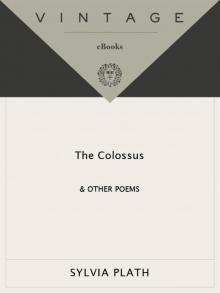 The Colossus
The Colossus Mary Ventura and the Ninth Kingdom
Mary Ventura and the Ninth Kingdom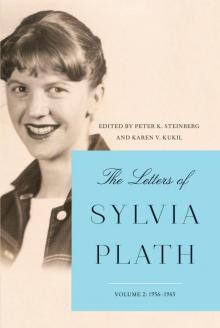 The Letters of Sylvia Plath Vol 2
The Letters of Sylvia Plath Vol 2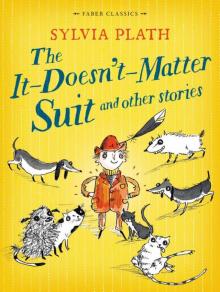 The It Doesn't Matter Suit and Other Stories
The It Doesn't Matter Suit and Other Stories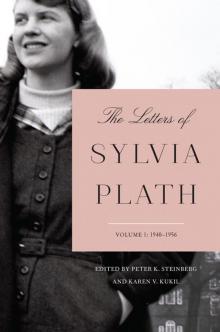 The Letters of Sylvia Plath Volume 1
The Letters of Sylvia Plath Volume 1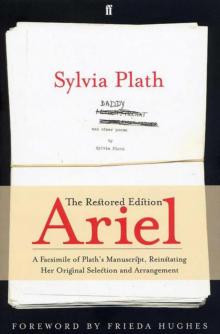 Ariel: The Restored Edition
Ariel: The Restored Edition Selected Poems of Sylvia Plath
Selected Poems of Sylvia Plath